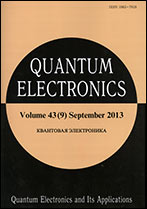|
This article is cited in 9 scientific papers (total in 9 papers)
Special issue 'Physics of ultracold atoms and their applications'
Conversion of nuclear spin isomers of water molecules under ultracold conditions of space
P. L. Chapovskiiab
a Institute of Automation and Electrometry, Siberian Branch of Russian Academy of Sciences, Novosibirsk
b Novosibirsk State University
Abstract:
The conversion rate of nuclear spin isomers of water molecules in space is calculated using the model of quantum relaxation in the absence of particle collisions. The model is based on the intramolecular mixing of the ortho and para states of H2O by the spinrotation interaction and on the interruption of the mixing by radiative transitions of a molecule in a thermal radiation field. The lifetime of water isomers at a thermal radiation temperature T = 50 K is ~2 × 107 years, and at a temperature T = 100 K it is 3 × 106 years. The lifetimes of the spin isomers of water molecules are found to be large, but still smaller, for example, than the age of the Solar System. The proposed process of conversion of the spin isomers of water molecules is important for areas of space with low (n < 1 cm-3) particle concentrations.
Keywords:
spin isomers of water molecules, ratio of ortho and para states of molecules in space, Solar System, interstellar space.
Received: 12.03.2019
Revised: 26.03.2019
Citation:
P. L. Chapovskii, “Conversion of nuclear spin isomers of water molecules under ultracold conditions of space”, Kvantovaya Elektronika, 49:5 (2019), 473–478 [Quantum Electron., 49:5 (2019), 473–478]
Linking options:
https://www.mathnet.ru/eng/qe17048 https://www.mathnet.ru/eng/qe/v49/i5/p473
|


| Statistics & downloads: |
| Abstract page: | 245 | | Full-text PDF : | 70 | | References: | 45 | | First page: | 5 |
|





 Contact us:
Contact us: Terms of Use
Terms of Use
 Registration to the website
Registration to the website Logotypes
Logotypes









